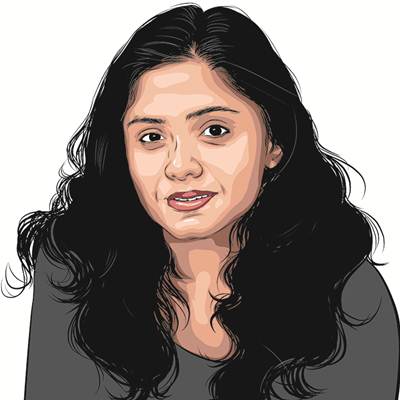Opinion Masking up is the responsibility of a community, not just an individual
Benita Fernando writes: We could one day be in a position where we are desperate for a fighting chance, and the only way to get it is for everyone to stay masked up
 For a cancer patient, a mask can determine the difference between lesser suffering or more, life and death. (AP Photo/File)
For a cancer patient, a mask can determine the difference between lesser suffering or more, life and death. (AP Photo/File) Three months after the pandemic started, my family faced the stressful diagnosis of cancer. A loved one would have to undergo a prolonged treatment plan spanning up to a year. If the pandemic was excruciating, managing cancer in it seemed doubly so. The vaccine was a distant hope at this point. A flu episode could be difficult to manage for a cancer patient with suppressed immunity, so one couldn’t imagine what Covid might mean. It came to define my family’s perspective on masking up, one that hasn’t changed till date.
The chance of isolation or social distancing was impractical if you are making multiple trips to hospitals and labs, as we were. It was hard to say if we, as patients and caregivers, would dodge the virus or not. The best we could do — all we could do — was to just sit tight behind our masks. Not all may agree, but for a cancer patient, a mask can determine the difference between lesser suffering or more, life and death. It’s knowledge that I wasn’t aware of some years ago.
For a decade, I lived in the vicinity of one of South Asia’s best, and busiest, cancer centres in Mumbai. On mundane trips to buy groceries or take the bus, I’d see patients, many of them children, wearing masks in crowded street corners and food stalls around the hospital. In my biased ignorance, I, like many others, assumed that the patients had to hide their faces, perhaps they didn’t want to be contagious. A mask in public was a sign of weakness and a sign of sickness. It was ominous unless you were a camera-toting tourist. It was similar to why people avoid going to a doctor — seeking a diagnosis means you are sick, not the other way round.
Things changed dramatically with the cancer diagnosis. In the last two years, I have told off customers at markets for wearing their masks incorrectly or for not wearing them at all. I have made snide comments in packed elevators and shamed people into pulling up their masks. The municipal corporation should be thankful. All this only because I knew that I couldn’t afford to catch a virus that would create a cross-mutation of irreversible crises in the family.
Today I find great joy and even liberation in masking up — I no longer smile politely at dull jokes or casual sexism, my eye make-up has improved significantly and I can talk to myself in public without drawing attention.
My family wore masks as much as possible through the course of the cancer treatment, sometimes doubling up in the second wave. It’s impossible for cancer patients to be masked up all the time, not only because they have difficulty breathing or are panicking or want a good cry or a wave of nausea has hit them. Sometimes it’s logistically unmanageable — like with feeding tubes that are needed in certain cancers. If patients eat when they can or at appointed hours, it means that some of this has to be done in crowded spots, which is practically all of Mumbai.
It’s why the current messaging around “mild” Omicron is disconcerting. It’s ableist, to start with. If you are young, or with no comorbidities, then Omicron may be as tolerable as a bad cold. With healthy populations reporting that Omicron hasn’t felt mild by any means, for cancer patients and others with immunocompromised conditions, Omicron can be twice as severe or lead to delays and interruptions in treatment plans. To say that Omicron is inevitable is to say that immunosuppressed people just have to deal with it, over and above everything else.
Our approach towards the pandemic and safety measures is also true of how cities are planned in India — so long as you are young and able, you should have no problem crossing the average busy intersection in an Indian city. If you aren’t, go figure. The slow change of messaging from cloth masks to N95 ones in the course of the Omicron surge is also part of this misguided approach. Even the cheapest N95 mask in the market is not affordable for large sections of India or even feasible.
Seeing through cancer in a pandemic showed us that masking up is the work of a community. The times that we had to remove our masks, we did so, thankful to the people around us in hospitals who were dutifully masked up. We breathed easy because of them.
We often assume that cancer, like Covid, is something that happens to other people and that we will somehow be insulated from it. It took Omicron to show us that Covid can happen to just about every other person in our circles. In the hubris of our youth or ableism, we forget that one day we could be in a position where we are desperate for a fighting chance, and the only way to get it is that the community stays masked up.
This column first appeared in the print edition on February 3, 2022 under the title ‘Why I wear a mask’. Write to the author at benita.fernando@expressindia.com





